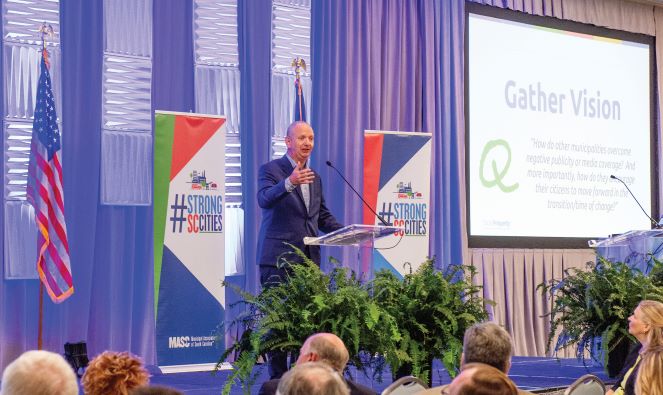The Municipal Association of SC formally launched its effort to promote civility in local government during the Annual Meeting, including the “Pillars of Civility,” a list of ways that officials can avoid the pitfalls of anger and dysfunction. One such pillar calls for officials working collaboratively to “concentrate on what you have in common, not what separates you.”
This advice caught the eye of Matt Lehrman, co-founder and managing director of Social Prosperity Partners, who served as the keynote speaker and who called it his favorite pillar. He said that it invited people to consider not just “civility” as the opposite of “incivility,” but also to see the choice between “scarcity” and “possibility.”
“When we talk from a position of scarcity, we are talking about the problems that we face in our community with incredible pressure upon us. Time pressure, budget pressure, and the like. It’s very common that those are win-lose scenarios,” he said. “When we are in a position of scarcity, we make all kinds of assumptions. We make assumptions that everyone who cares about this was notified that everyone had a chance to participate that everyone was heard and respected … But when we switch our mindset from scarcity to possibility, then we’re in a place where we can continually be inviting more people to join in our process. It is an additive, there’s not a win-or-lose.”

Matt Lehrman, co-founder and managing director of Social Prosperity Partners,
discussed the process of inviting all stakeholders to join in solving community
problems during the Municipal Association’s Annual Meeting.
For bringing as many people together as possible, Lehrman called upon his audience to create connections among their communities and build a meaningful vision of what the community can achieve. This requires understanding whether groups of community members have high levels of ability to participate, and whether they have high levels of desire to participate.
He described those with high ability and desire as “devoted,” or the people who are keenly focused on an issue.
“You know who those people are because they are calling you day and night,” he said, adding that this group needs to be respected and heard to maximize the chance of a civil conversation.
The next group, the low-ability but high-desire group, Lehrman called “oriented” to important issues in the community.
“And when they show up, they need to be received,” he said. “They deserve accountability. They deserve a collection of ideas that were voiced that go on a website or on a follow-up message somewhere that says ‘we heard you.’”
Lehrman described those who are low-ability and low-desire as “asleep” to the issues of the community, often because of other matters competing for their attention. He said officials will often be tempted to leave this group alone because it minimizes problems.
“I would ask, where is your responsibility to wake people up to let them know that there’s an issue that they might want to pay attention to? Even at the risk that those people will disagree with your position. Your job isn’t to win. Your job is to make people feel engaged and connected meaningfully in your community.”
The final group, he said, is one with significant possibility, the high-ability, low-desire group — those who are “uninspired.” This group can be activated with the right push, according to Lehrman, as happened in 2014 when the ALS Association created a popular social media trend to raise money through the “Ice Bucket Challenge.” He noted that many of those who dumped ice water on their heads on camera to raise this money likely did not initially care about the progressive neurodegenerative disease known as ALS.
“Make them work on topics that feel significant to them, and give them meaningful ways to participate. Make it fun,” he said.
Creating these connections can help officials make great achievements, Lehrman said, because “where people work together courageously, their potential is unlimited.”
